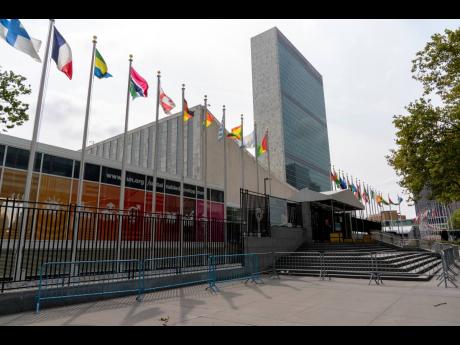Born to prevent war - UN at 75 faces deeply polarised world
UNITED NATIONS (AP):
Born out of World War II’s devastation to save succeeding generations from the scourge of conflict, the United Nations (UN) officially marks its 75th anniversary today at an inflection point in history, navigating a polarised world as it faces a pandemic, regional conflicts, a shrinking economy and growing inequality.
Criticised for spewing out billions of words and achieving scant results on its primary mission of ensuring global peace, the UN nonetheless remains the one place that its 193 member nations can meet to talk.
And as frustrating as its lack of progress often is, especially when it comes to preventing and ending crises, there is also strong support for its power to bring not only nations but people of all ages from all walks of life, ethnicities and religions together to discuss critical issues like climate change.
Secretary General Antonio Guterres, looking back on the UN’s history in an AP interview in June, said its biggest accomplishment so far is the long period during which the most powerful nations didn’t go to war and nuclear conflict was avoided. Its biggest failing, he said: its inability to prevent medium and small conflicts.
The United Nations marked its actual 75th anniversary – the signing of the UN Charter in San Francisco on June 26, 1945 by delegates from about 50 countries – on that date this year at an event scaled down because of the coronavirus pandemic.
Then, Guterres said people are continuing to lose trust in government and political establishments. He had warned about the rise of populism triggering increasing threats to multilateralism and called for multilateralism to be given “teeth”. He has often denounced what he calls a “groundswell of xenophobia, racism and intolerance”.
He also urged the inclusion of civil society, cities, the private sector and young people at top tables, saying they are “essential voices in shaping the world we want”.
Today’s mainly virtual official commemoration will not be a celebration. It will include a declaration on the UN’s 75th anniversary, approved by diplomats from all UN member states after sometimes heated negotiations. Then, representatives from over 180 countries are expected to deliver pre-recorded speeches lasting three minutes.
The declaration recalls the UN’s successes and failures over more than seven decades and vows to build a post-pandemic world that is more equal, works together, and protects the planet.
“The urgency for all countries to come together, to fulfil the promise of the nations united, has rarely been greater,” it says, while praising the United Nations as the only global organisation that “gives hope to so many people for a better world and can deliver the future we want”.

